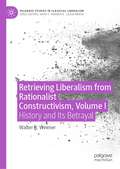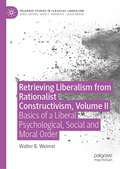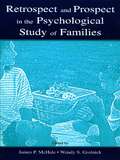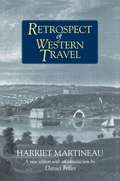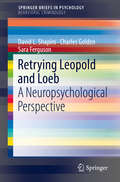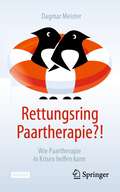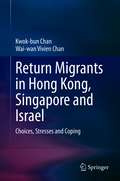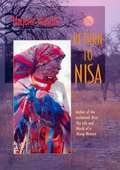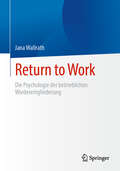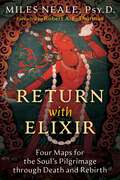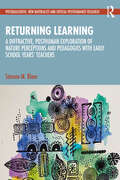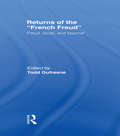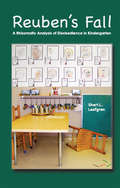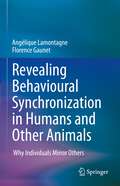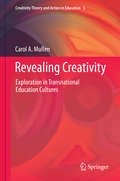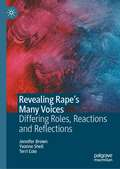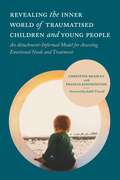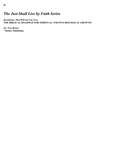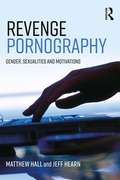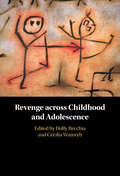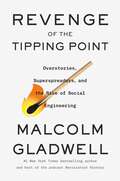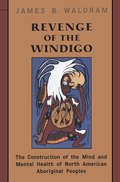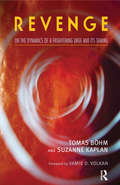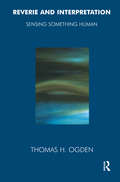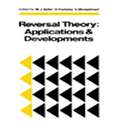- Table View
- List View
Retrieving Liberalism from Rationalist Constructivism, Volume I: History and Its Betrayal (Palgrave Studies in Classical Liberalism)
by Walter B. WeimerThis first volume, History and its Betrayal, traces the development of major themes of liberalism from the increase in human population beyond the limits of the face-to-face society of tribalism and small groups up until the present day. It shows that the principles underlying liberalism are the evolutionary development of social organizations that have resulted from the complexity of human action rather than any conscious design or purpose.This book draws out the differences between the classical liberalism dependent upon spontaneous and tacit ordering as a result of evolution, and the explicit or conscious or directed version of progressivism. It shows that the most important recent developments in the philosophy of rationality and the methodology of scientific research, as well as in evolutionary epistemology and the philosophy of biology, actually stem from the theories of complex social organization of the moralists such as Hume, Ferguson, and Smith. The book shows clearly that classical liberalism was never refuted—indeed, no attempt to do so has been offered—it has simply been ignored in favour of programs which sound beneficial and soothing but which cannot be instituted without returning to tribalism.
Retrieving Liberalism from Rationalist Constructivism, Volume II: Basics of a Liberal Psychological, Social and Moral Order (Palgrave Studies in Classical Liberalism)
by Walter B. WeimerThis second volume, Basics of a Liberal Psychological, Social and Moral Order, overviews developments in the theory of spontaneously ordered complex phenomena, the psychology of inference and expectation, the nature of anticipatory systems in the psychological and economic domains, and the evolution of scientific thought and knowledge. The book applies these insights to the nature of markets and morals, what education should consist of, and the problems of alienation and our existential malaise as we move into an increasingly abstract society. In doing so it also shows the unscientific nature of the rationalist constructivist approach of progressivism, and the disastrous consequences that would arise from following these positions. The book shows the complex interplay between top-down or directed structures (what Hayek and others have called taxis organizations) and far more complex orders of the social or psychological cosmos in which they are embedded as constituents. It details how the key to the market orders of society depends upon their capacity to impersonally convey information to agents. Markets can serve unknown and unforeseen ends for individuals who do not know or have contact with other market participants. This is a vastly more powerful and productive system than anything that can arise in a tribal or face-to-face organization limited to personal contact, such as the sort proposed by the constructivists. The book will be of interest to academics and scholars in classical liberalism, economics and political philosophy.
Retrospect and Prospect in the Psychological Study of Families
by Wendy S. Grolnick James P. McHaleThis book assembles 11 of the leading thinkers and researchers in the field of family psychology to create a compendium summarizing both what psychology researchers have learned about the family and where the field should be going next. It evolved after the volume's contributors met with other distinguished family scholars to discuss family influences on child development and to ponder how this knowledge could be used to benefit families and children. This volume includes approaches to the family that feature multiple levels and topics of focal interest to benefit anyone interested in the family. Central topics include mothering, fathering, marriages, family group processes, sibling relations, and families as systems. In addition, three senior authors offer road maps to detect, and suggest (a) challenges in research on parenting, (b) marital and family dynamics, and (c) family systems in the years ahead. In keeping with the theme of how research affects the lives of families outside the university lab settings, this volume includes a chapter on the interface between family research and law. This book closes with a "big picture" analysis and critique of what is known and not known. Psychologists, anthropologists, sociologists, and public policymakers interested in the family should especially find this volume of interest.
Retrospect of Western Travel
by Harriet Martineau"This new abridgement of the original 1838 edition offers a view of Jacksonian America. Here are Martineau's condemnation of slavery and her championship of abolition and women's rights; her incisive portraits of Jackson, Clay, Calhoun, Webster, Garrison, Emerson, and the Beechers; her observations of American schools, asylums, colleges, and prisons; and her eyewitness accounts of a presidential assassination attempt, a lynch mob, a slave auction, a Quaker wedding, and a Harvard commencement. Historian Daniel Feller, author of The Jacksonian Promise, introduces the narrative, identifies the major characters, and provides an index for easy use. "--BOOK JACKET. Title Summary field provided by Blackwell North America, Inc. All Rights Reserved
Retrying Leopold and Loeb: A Neuropsychological Perspective (SpringerBriefs in Psychology)
by David L. Shapiro Charles Golden Sara FergusonThis book retrospectively analyzes the notorious 1924 case of Leopold and Loeb, in which two college students murder a young boy just to prove they could do it. In the almost hundred years since that trial, the field of neuroscience along with neuropsychology have expanded tremendously, and there are now much more sophisticated tools that could be used to evaluate the perpetrators of this crime. Although deemed mentally ill at the time, there was not much scientific evidence that could be brought to bear on the defendants’ and their behavior. Now a legal psychologist and a neuropsychologist team up to tackle the case from a modern viewpoint. Using contemporary knowledge of the brain and behavior they map out the way the case might be handled today. Not just of historical interest, this volume serves as a case study for students and professionals alike, and a review of procedures used in such difficult cases.
Rettungsring Paartherapie?!: Wie Paartherapie in Krisen helfen kann
by Dagmar MeisterEiner der wichstigsten Bestandteile unseres Lebens sind unsere Beziehungen; zu unserer Familie, Freunden, Kollegen, vor allem aber zu unserer/m PartnerIn. Diese Beziehungen verändern sich im Laufe der Zeit und insbesondere Paare werden mit unterschiedlichsten Herausforderungen konfrontiert. Gerät die gute Beziehung, mit dem Menschen, bei dem wir mal Schmetterlingsgefühle im Bauch hatten, ins Wanken, fühlen wir uns oft hilflos.Dagmar Meister hat viele Jahre mit Paaren gearbeitet, die an diesem Scheideweg standen, und hat ihnen geholfen, den für sie richtigen Weg zu finden. In diesem leicht zu lesenden Buch, erklärt sie anhand von praktischen Beispielen was die häufigsten Ursachen für Probleme sind und warum Paarbeziehungen komplexer sind, als wir auf den ersten Blick vermuten. Zudem finden Sie hier Antworten zu typischen Fragen rund um die Rahmenbedingungen einer Paartherapie.Erfahren Sie, wie Paartherapie helfen kann, den alten Zauber wiederzufinden oder eine neue Form der Liebe aufzubauen.
Return Migrants in Hong Kong, Singapore and Israel: Choices, Stresses and Coping
by Kwok-bun Chan Wai-wan Vivien ChanThis insightful volume explores the experiences of ethnic migrants returning to Hong Kong, Singapore, and Israel. Return migrants who were exposed to the western culture and society undergo personal transformations that significantly impact their views on values such as gender, individualism, democracy, tradition, and individual autonomy. To evaluate how well these individuals are able to reintegrate back into their native countries, the authors conducted a thorough comparative study between returnees in the three research sites through in-depth interviews, ethnographic fieldwork, and analyses of government policies. Among the topics discussed: Family as a strategic middle ground between the individual and societyThe social psychology of coping and adaptationPublic, outer historical, and macro forces that shape returnees’ experiences Comparisons and contrasts between two primarily Chinese societies, along with one racially and culturally different Western society Cost-and-benefit analyses of decision-making in migration Return Migrants in Hong Kong, Singapore, and Israel is a compelling new perspective on the migrant experience drawn from in-depth research on returnees across three countries and a variety of circumstances.
Return to Nisa
by Marjorie ShostakThis is the story of two women--one a hunter-gatherer in Botswana, the other an ailing American anthropologist,and the remarkable relationship between these two women from different worlds.
Return to Work: Die Psychologie der betrieblichen Wiedereingliederung
by Jana WallrathDie Psychologie verfügt über einige bewährte Methoden, die auch im Kontext der betrieblichen Wiedereingliederung von Mitarbeiter*innen nützlich sind. Warum also auf ihren Einsatz verzichten? Das ist das Versprechen dieses Buches: Mit klaren Beschreibungen der Zusammenhänge und Hintergründe und mit dem Fokus auf die zurückkehrenden Mitarbeiter*innen erhalten alle am BEM-Prozess Beteiligten Zugang zu den wirksamsten psychologischen Werkzeugen. Damit werden die Akteur*innen im Unternehmen noch wirksamer darin, die Fachkräfte als wichtigste Ressource zu erhalten und die positive Unternehmenskultur weiterzuentwickeln. So wird das Ziel, Krisen zu meistern und gestärkt aus ihnen hervorzugehen, sicher erreicht.
Return with Elixir: Four Maps for the Soul's Pilgrimage through Death and Rebirth
by Miles Neale• Shares four maps for spiritual rebirth based on Joseph Campbell, Carl Jung, Tibetan Buddhist philosophy, and the precession of the equinoxes• Traces the author&’s journey of rebirth, covering his transformation through a spiritual crisis and the creation of a more meaningful life• Provides visualization practices based on ancient Tibetan wisdom to support you on the path of self-realizationExploring wisdom from mystical traditions and perennial philosophy on "dying before you die," Buddhist psychotherapist Miles Neale shares his own hero&’s journey of rebirth, providing a detailed roadmap for the pilgrimage through dissolution, into the great mystery, and back again to the world. He shares his transformation through a spiritual crisis and, ultimately, his creation of a more meaningful life. He provides four intersecting maps to help guide readers through the experiential process of metaphoric death, reclaiming the soul, and sharing one&’s genius with others. These four maps—the cosmological map, psychological map, alchemical map, and mythopoetic map—draw on the mythological stages of Joseph Campbell, Carl Jung&’s process of individuation, the Tibetan Buddhist alchemy of conscious rebirth, and the astrological phenomenon of the precession of the equinoxes, offering a detailed philosophical underpinning for the soul&’s journey to immortality. He also provides in-depth visualization practices based on ancient Tibetan wisdom to support you on the path of self-realization.Integrating Tibetan Buddhism with psychology, trauma healing, neuroscience, and mythology, along with profound personal experience, Neale provides a step-by-step manual for spiritual rebirth, revealing how to reframe life&’s unrelenting challenges and transitions as opportunities for psychological growth.
Returning Learning: A Diffractive, Posthuman Exploration of Nature Perceptions and Pedagogies with Early School Years’ Teachers (Postqualitative, New Materialist and Critical Posthumanist Research)
by Simone M. BlomReturning Learning explores early school years teachers’ perceptions of nature and how this informs their pedagogy through a posthuman theoretical framework. The theoretical framework is purposefully designed to disrupt dichotomies and reject abuse to marginalised others. In doing so, this book offers a reconceptualisation of learning in environmental education, and education more broadly.The posthuman theoretical framework is a transdisciplinary offering informed by material-discursive practices, affective atmospheres, and childhoodnature. The theoretical framework and transqualitative methodology support diffractive ethnographic methods where data are generated through an iterative and entangled data collection and data analysis process. This process is presented as a series of "diffractive data entanglements" that explore teachers’ perceptions of nature, their pedagogical practices, and the implications of these data through a posthuman framing. These non-conventional approaches to undertaking research are the foundation for this book that listens to teacher’s voices by conducting research with teachers rather than to teachers.Through a deep exploration into the intricacies of everyday classroom practices and happenings, this book privileges the voices of the teachers and the nonhuman, thus the response-ability of teachers to their students and the planet, is re-turned. It will be of interest to researchers who are interested in creative and innovative theories and methodologies as well as those studying environmental education and other pedagogical studies as part of their courses.
Returns of the French Freud: Freud, Lacan, and Beyond
by Todd DufresneCreating a snapshot of current thinking about psychoanalysis, this lively collection examines the legacy of Freud and Lacan. Through provocative and penetrating arguments, the contributors take psychoanalysis to task for 0ts dark view of human nature, theoretical sorcery, devaluation of femininity, self-referentiality, discipleship, negativity, ignorance of history and more. The essays also examine the complex relationships between Freudian and Lacanian theory and philosophy, feminism, anthropology, communications theory, deconstruction, Foucauldian genealogy and medical history. The outstanding list of contributors includes Paul Roazen, Francois Roustang, John Forrester, Rodolphe Gasche, Mikkel Borch-Jacobsen and Jacques Derrida.
Reuben's Fall: A Rhizomatic Analysis of Disobedience in Kindergarten (International Institute for Qualitative Methodology Series #12)
by Sheri L LeafgrenThis study offers a lens on two kindergarten classrooms, examining moments of disobedience as children interacted with children, their teachers, and the space and time elements of the classroom environments. Through Eisner’s educational criticism, author Sherry Leafgren also examines the elements of school, kindergarten and teachers within the spaces of their intersections with the children. While past research has directed our attention to addressing the problem of classroom disobedience, Leafgren provides an opportunity and means to view these familiar actions through fresh lenses of possibilities. Predicated by an event in the researcher’s teaching life, she utilizes Deleuze and Guattari’s rhizoanalysis to openly seek lateral paths of understanding by linking and folding the findings with texts other than those that would be normally used toward developing new understandings and questions regarding children’s disobediences. An earlier version of this book was awarded the distinguished dissertation award from the International Institute for Qualitative Methodology.
Revealing Behavioural Synchronization in Humans and Other Animals: Why Individuals Mirror Others
by Angélique Lamontagne Florence GaunetThis book presents a thorough and up-to-date review of the scientific literature on behavioural synchronization and its underlying neurocognitive and neurophysiological processes, from the neuronal to the interindividual and group scale. This multi-disciplinary and multi-scale approach makes this book of interest to scientists and graduate students for both theoretical issues as well practical issues such as mobilizing animals and humans for group / mass actions (e.g. for climate change, diabetes, leading animals, etc.).
Revealing Creativity: Exploration in Transnational Education Cultures (Creativity Theory and Action in Education #5)
by Carol A. MullenRevealing Creativity: Exploration in Transnational Education Cultures explores the recovery and fostering of creativity under educational constraint. This longitudinal global study of diverse education populations in China, Canada, and Australia offers application of the 4-C Creativity Model through experiential activities and exploratory interviews within classrooms and other learning spaces. Transnational in scope, this book describes an original innovative method, process, and tool for addressing obstacles to creativity in educational environments and within the self that constitute a significant challenge to practice. Through an immersive encounter with a validated creativity model, diverse cultural groups were guided to interpret the 4-C classification system and uncover their latent potential as creators. For their own purposes, readers can adapt the dynamic model-as-method process for releasing and revealing creativity within accountability-bound competitive cultures.
Revealing Rape’s Many Voices: Differing Roles, Reactions and Reflections
by Jennifer Brown Yvonne Shell Terri ColeBy extending the cast list of roles implicated in rape’s hidden sphere of harm, this book attentively listens to experiential voices of complainant/witnesses, suspect/accused, police, lawyers, judges and jurors, therapists, advocates, partners, parents, family and friends during the criminal justice journey. Highlighting good and bad practices, it proposes a paradigm shift for inculcating policy reform, arguing the case for implementation science as a framework for embedding change. The book will be of interest to those involved in the policy, practice and delivery of criminal justice, the support and voluntary sector as well as giving valuable insight to students of forensic and investigative psychology, criminology, law, social policy, gender studies the new policing apprenticeship degree programmes.
Revealing the Inner World of Traumatised Children and Young People: An Attachment-Informed Model for Assessing Emotional Needs and Treatment
by Jonathan Stanley Christine Bradley Francia Kinchington Judith Trowell Dr Alistair Cooper John Diamond John WhitwellBringing together the latest research and theory about a child's inner world and the impact of the world around them, this is a guide to understanding and responding to the emotional needs of traumatised children. Founded on the principle that traumatised children do not have a secure sense of self and therefore cannot relate to the outside world without becoming overwhelmed, this book brings psychoanalytic and psychodynamic understandings of child psychology together with current neuroscience and trauma theory. At the heart of the book is an attachment-informed assessment model and guidance for treatment. Professionals working therapeutically with traumatised children, including therapists, psychologists, psychiatrists, mental health workers, social workers and residential care workers, will benefit from the wealth of knowledge and valuable practice guidance presented in this book.
Revelations That Will Set You Free: The Biblical Roadmap for Spiritual and Psychological Growth
by Troy ReinerSalvation begins with faith but many Christians are frustrated trying to live the Christian life in this world. They want to serve Christ but find that they fail again and again in their attempts to get victory over sin, overcome the flesh, die to the self, and love others. Most have no definite idea of how these goals are to be achieved. This should not be the case because the Bible gives us a clear road map to spiritual and psychological maturity; it is accomplished revelation by revelation as we grow in our knowledge of God. It is not enough to have the knowledge of God in our minds or even to love Him with our emotions-faith must grow in our spirit. Only through this kind of faith is it possible to overcome our selfishness, develop the self-discipline necessary to conquer sin, and achieve a life of peace motivated by unconditional love. This book clearly and concretely explains each step in this process, identifies the spiritual revelations required, and provides methods and models for assisting us in moving to the next step. The goal of this book is to remove the mystery that shrouds the process of spiritual and psychological growth so that the path to spiritual maturity can be clearly seen and followed.
Revenge Pornography: Gender, Sexuality and Motivations
by Matthew Hall Jeff HearnFacilitated by developments in technologies, the non-consensual posting of sexually explicit images of someone else for revenge, entertainment or political motive – so-called revenge porn – has become a global phenomenon. This groundbreaking book argues that fundamental and recurring issues about how victims are violated can be understood in terms of gender and sexual dynamics and constructions, binary gender and sexual positioning and logics, and the use of sexual meanings. Using a discourse analytical approach the authors examine revenge pornography through the words of the perpetrators themselves and study the complex ways in which they invoke, and deploy, gender- and sexuality-based discourses to blame the victim. They explore strategies to curb the phenomenon of revenge porn, and by placing their research in a broader social and political context, the authors are able to examine the effectiveness of current legislative frameworks, education and awareness raising, victim support and perpetrator re-education programmes, along with wider political considerations. This enhanced understanding of the perpetrator mindset provides important insights into the use of social media to facilitate gender violence, and holds the promise of more effective interventions in future. This is a unique resource for students, academics, researchers, and professionals interested in revenge pornography and related issues.
Revenge across Childhood and Adolescence
by Cecilia Wainryb Holly RecchiaThis volume brings together research on revenge across childhood and adolescence to explore how revenge is a part of normative development, but also arises from maladaptive social environments. The chapters demonstrate the ways in which revenge is intertwined with social, emotional, cognitive, and moral development as well as being informed by interpersonal experiences within familial, educational, community, and cultural social settings. The book summarizes international scholarship on revenge across early childhood to late adolescence from a wide variety of interdisciplinary perspectives to provide a comprehensive overview of the field. The authors address how individual differences in revenge emerge as an adaptation to the challenges faced when growing up in adverse social and societal conditions. They then suggest a range of avenues for effective intervention that take account of the complexity of revenge as a psychological and social phenomenon.
Revenge of the Tipping Point: Overstories, Superspreaders, and the Rise of Social Engineering
by Malcolm GladwellAN INSTANT NEW YORK TIMES BESTSELLERMost Anticipated in:AARP | Associated Press | Time Magazine | Oprah Daily | Chicago Tribune | Literary Hub | Publishers Weekly | Publishers LunchTwenty-five years after the publication of his groundbreaking first book, Malcolm Gladwell returns with a brand-new volume that reframes the lessons of The Tipping Point in a startling and revealing light. Why is Miami…Miami? What does the heartbreaking fate of the cheetah tell us about the way we raise our children? Why do Ivy League schools care so much about sports? What is the Magic Third, and what does it mean for racial harmony? In this provocative new work, Malcolm Gladwell returns for the first time in twenty-five years to the subject of social epidemics and tipping points, this time with the aim of explaining the dark side of contagious phenomena. Through a series of riveting stories, Gladwell traces the rise of a new and troubling form of social engineering. He takes us to the streets of Los Angeles to meet the world&’s most successful bank robbers, rediscovers a forgotten television show from the 1970s that changed the world, visits the site of a historic experiment on a tiny cul-de-sac in northern California, and offers an alternate history of two of the biggest epidemics of our day: COVID and the opioid crisis. Revenge of the Tipping Point is Gladwell&’s most personal book yet. With his characteristic mix of storytelling and social science, he offers a guide to making sense of the contagions of modern world. It&’s time we took tipping points seriously.
Revenge of the Windigo
by James WaldramWhat is known about Aboriginal mental health and mental illness, and on what basis is this 'knowing' assumed? This question, while appearing simple, leads to a tangled web of theory, method, and data rife with conceptual problems, shaky assumptions, and inappropriate generalizations. It is also the central question of James Waldram's Revenge of the Windigo.This erudite and highly articulate work is about the knowledge of Aboriginal mental health: who generates it; how it is generated and communicated; and what has been ? and continues to be ? its implications for Aboriginal peoples. To better understand how this knowledge emerged, James Waldram undertakes an exhaustive examination of three disciplines ? anthropology, psychology, and psychiatry ? and reveals how together they have constructed a gravely distorted portrait of 'the Aboriginal.'Waldram continues this acute examination under two general themes. The first focuses on how culture as a concept has been theorized and operationalized in the study of Aboriginal mental health. The second seeks to elucidate the contribution that Aboriginal peoples have inadvertently made to theoretical and methodological developments in the three fields under discussion, primarily as subjects for research and sources of data. It is Waldram's assertion that, despite the enormous amount of research undertaken on Aboriginal peoples, researchers have mostly failed to comprehend the meaning of contemporary Aboriginality for mental health and illness, preferring instead the reflection of their own scientific lens as the only means to properly observe, measure, assess, and treat.Using interdisciplinary methods, the author critically assesses the enormous amount of information that has been generated on Aboriginal mental health, deconstructs it, and through this exercise, provides guidance for a new vein of research.
Revenge: On the Dynamics of a Frightening Urge and its Taming
by Tomas Bohm Suzanne KaplanThe revenge motif appears in a number of arenas and in different cultures. We need to be mindful of its existence in order to discover how common it is. We can then learn to recognize when destructive revenge spirals are developing. By extension, we thus gain a basis for stopping these spirals successfully before they have gone too far. We can also learn what function revenge plays and has played in various contexts. A short overview of revenge as a motif in literature, film, culture, religion, and at work is therefore given as an introduction to our study of revenge.
Reverie and Interpretation: Sensing Something Human
by Thomas OgdenThis book is concerned with an attempt to use language to capture/convey a sense of the delicate interplay of aliveness and deadness of human experience in the analytic setting represents a major challenge to contemporary psychoanalysis.
Reversal Theory: Applications and Development
by M. J. APTER, D. FONTANA and S. MURGATROYDFirst published in 1985. Routledge is an imprint of Taylor & Francis, an informa company.
